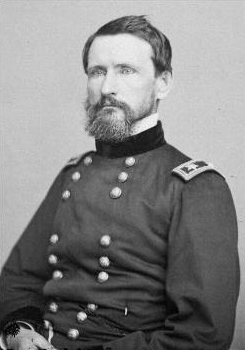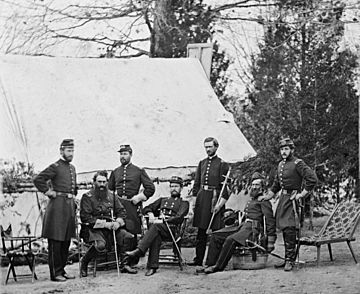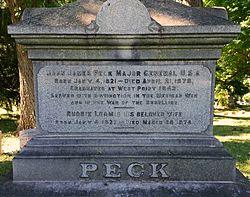John J. Peck facts for kids
Quick facts for kids
John James Peck
|
|
|---|---|

John J. Peck
|
|
| Born | January 4, 1821 Manlius, New York |
| Died | April 21, 1878 (aged 57) Syracuse, New York |
| Place of burial |
Oakwood Cemetery, Syracuse, New York
|
| Allegiance | United States of America Union |
| Service/ |
United States Army Union Army |
| Years of service | 1843–1853, 1861–1865 |
| Rank | |
| Commands held | Army of North Carolina |
| Battles/wars | American Civil War |
John James Peck (January 4, 1821 – April 21, 1878) was an American soldier. He fought bravely in two important wars: the Mexican–American War and the American Civil War. He became a high-ranking officer, a Major General, and was known for his leadership and courage.
Contents
Growing Up and Early Training
John James Peck was born on January 4, 1821, in Manlius, New York. His father, John W. Peck, had served in the War of 1812. The family home in Manlius is very old and is now a historic landmark.
When he was 18, Peck joined the United States Military Academy at West Point. He was a very good student, graduating eighth in his class in 1843. Many of his classmates, like Ulysses S. Grant, also became famous military leaders. After West Point, he became a second lieutenant in the artillery. He was stationed in New York until 1845.
Fighting in the Mexican-American War
In 1846, Peck was promoted to second lieutenant. He fought in the Mexican–American War. He was part of General Zachary Taylor's army. He fought in battles like Palo Alto, Resaca de la Palma, and Monterrey.
Later, he joined General Winfield Scott's army. He landed at Vera Cruz and fought in all the major battles. These battles led to the fall of Mexico City. Peck was recognized for his bravery. He was promoted to captain for his actions at Contreras and Churubusco. He was promoted again to major for his service at the battle of Molino del Rey. His commanders praised his excellent work.
After the war, Peck returned to the U.S. He worked in the army's supply department. He also fought against the Apache Indians on the frontier.
Life Before the Civil War
Peck left the army on March 1, 1853. He then became the treasurer for a railroad project in New York. In 1856, he ran for Congress as a Democratic candidate.
Before the Civil War began, he was a cashier at the Burnett Bank of Syracuse. He was one of the bank's founders. Peck also served as the president of the Syracuse board of education. He kept this position even when he returned to active military service.
Serving in the Civil War

From left to right: Lieutenant Daniel Lodor Jr., Aide de Camp; Major T. Rush Spence, Brigade Surgeon; Captain Green, Brigade Commissary; General John J. Peck; Captain William H. Morris, Assistant Adjutant Surgeon; Captain Silas Titus, Brigade Quarter Master (later Colonel of the 122nd NY Onondaga Regiment); Lieutenant Charles R. Sterling, Aide-de-Camp.

The start of the Civil War brought Peck back into the army. He became a brigadier general of volunteers on August 9, 1861. He first commanded a group of soldiers defending Washington, D.C. Soon after, he joined General George B. McClellan's Army of the Potomac in Virginia.
The Peninsula Campaign in Virginia
During the Peninsula Campaign, Peck led the 3rd Brigade. He served in the siege of Yorktown. He showed great skill in the battles of Williamsburg and Fair Oaks. He was then given command of the 2nd Division. He again showed his leadership during the Seven Days Battles. For his excellent service at the Battle of Malvern Hill, he was promoted to major general on July 25, 1862.
Defending Suffolk, Virginia
When McClellan's army left the peninsula, Peck was left in charge of Union troops at Yorktown. In September, he took command of all Union forces south of the James River in Virginia.
In 1863, the city of Suffolk became very important. Suffolk protected the land routes to the Union naval yards at Portsmouth and Norfolk. Peck took command of the troops defending Suffolk. His headquarters were at the Riddick House.
Peck learned about the Confederate army's plans to attack Suffolk. This gave him time to prepare. During the siege of Suffolk, the Confederates cut off the Union supply route. But Peck quickly launched a counter-attack. He recaptured the lost positions in the battle of Hill's Point. The Confederates then ended their siege. General John A. Dix, Peck's superior, praised his strong defense of Suffolk.
After the siege, Peck was transferred to command the District of North Carolina. He saw little action there. Due to health problems, he took sick leave. At the request of General Dix, he returned to command the Canadian border for the rest of the war.
After the War
After the Civil War ended, Peck went back to Syracuse, New York. He became the president of the New York State Life Insurance Company. His health got worse over time. He passed away on April 21, 1878, at his home in Syracuse.
 | May Edward Chinn |
 | Rebecca Cole |
 | Alexa Canady |
 | Dorothy Lavinia Brown |

